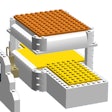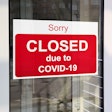
The shortage of MRI equipment in France is becoming increasingly alarming as patients have to wait almost 40 days to undergo an examination, the longest delay in the past 10 years, according to figures from Cemka-Eval, which specializes in health economics, epidemiology, and outcomes research.
In France, an oncologic patient in need of an emergent MRI lumbar scan must wait an average of 37.7 days, 7.2 days more than last year. The figures, posted on the website of the French Society of Radiology (Société Française de Radiologie, SFR) on 7 July, represent the worst outcome since Cemka-Eval started its annual assessment 11 years ago and are a serious threat to France's newest Cancer Plan, which aims to reduce waiting times to 20 days by 2019. The delays continue to be very worrying, the authors noted.
"This report points out a disaster," said Dr. Philippe Soyer, PhD, the general secretary of the Syndicate of Radiologists of Public Hospitals (Syndicat des Radiologues Hospitaliers). "The worst thing is that the delay in question may reach up to two months for a patient with a suspicion of liver cancer ... it is almost criminal to let a patient wait so long to confirm the diagnosis and start further treatment. Waiting two months is a lost chance for the patient."
The problem is that many MRI units are used for musculoskeletal indications, he explained. Also, the growth of cardiac MRI was anticipated by the government, so there has been a dramatic increase in the potential indications, and these emerging indications have not been anticipated.
"One solution to manage the paucity of equipment would be to select indications and patients according to the suspected diagnosis," Soyer continued. "It is not normal that a patient with a liver metastasis has the same delay for an appointment as a patient with a mild pain in the knee. But some radiologists are reluctant to do this. The major problem in France is that we are still underequipped and one of the worst countries in Europe. This is the actual problem."
The results of the study come as another blow to the under-siege French MRI sector, which already lags behind its neighbors. While Western Europe as a whole has an average of 20 MRI machines per million citizens, France has only 10.7 machines per million, prompting less than flattering comparisons from the radiological community. France has fewer machines than Slovenia and Croatia, and three times fewer than Germany, whose average hovers around 30 per million.
As most countries continue to expand their equipment, the 38 French machines added in 2013 do little to fill the gap. In fact, experts say that 50 new scanners per year are needed to meet the objectives defined by the various public health plans and good practice guidelines.
Unfortunately, the planned growth of MRI in France may add to the problems and is incompatible with the objectives defined by the healthcare organization regional schemes (les schémas régionaux d'organisation des soins, SROS), according to Imagerie Santé Avenir (ISA), an association of medical imaging and healthcare professionals, which commissioned the study.
Nearly 60 systems are due to be introduced by the end of 2014, and 100 osteoarticular MR examinations have already been planned for the next two years, straining the examination authorization potential to its limits in most regions. A rapid and substantial revision of MRI objectives is needed to face the demands of the various government plans, ISA recommended.
MRI indications continue to increase by 5% to 10% each year and are in line with radiation protection demands from health and nuclear safety authorities. But there seems to be a persistent misunderstanding as to the urgency of the situation. Recent comments from the National Health Insurance Fund for Salaried Workers (Caisse Nationale d'Assurance Maladie des Travailleurs Salariés, CNAMTS) added fuel to the fire by alleging that rapid growth in MRI risks is encouraging an increase in unnecessary exams. The SFR vigorously reacted to the comments and released a strong statement, calling for a halt to the confusion over MRI caused by the CNAMTS' position.
"[MRI] meets a concrete need for quality and appropriate care as specified in the Good Practice Guidelines for Imaging (GBU) developed by the SFR and the French Society for Nuclear Medicine," the SFR stated. "The catch-up plan in MRI, sought for many years by imaging professionals, is more pertinent than ever if we wish to respond to issues in public health, with regard to quality and emergency care, and also equality in access to innovation across the country."
The previous, more ambitious Cancer Plan had set the limit to 15 days nationwide and 10 days in regions with high cancer mortality. This year, however, none of these regions are able to offer examinations within less than 30 days, except Nord-Pas de Calais (26.3 days). In Brittany, Alsace, and Lorraine, patients have to wait up to 50 days, and up to 64 days in Lower Normandy.
Waiting times have increased across the country, except in Midi-Pyrénées, Languedoc Roussillon, and Provence-Alpes-Côte d'Azur (PACA). Regional discrepancies are on the rise, in spite of a political discourse permanently stressing the need to fight against social and geographical inequalities, according to ISA.
Commenting on this latest report from Cemka-Eval, another senior French radiologist said there is a strong industrial lobby behind this recurrent study and there are some pitfalls in it, particularly the clinical case used for appointment seeking, which is far from real life.
"Regional agencies (ARS) have their own policies and may not give their support for MRI in some parts of the country, as is the case in Paris/greater Paris," the source stated. "Another point is that there is not much funding for hospitals (private practice is taking its own risks) and some hospitals cannot afford such expenses."



















